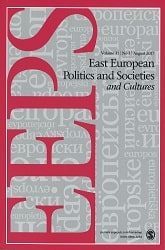Czechoslovak Generational Experience of 1968: The Intellectual History Perspective
Czechoslovak Generational Experience of 1968: The Intellectual History Perspective
Author(s): Kristina AndělováSubject(s): Civil Society, History of ideas, Political history, Marxism, Government/Political systems, Post-War period (1950 - 1989), History of Communism, Sociology of Politics
Published by: SAGE Publications Ltd
Keywords: generation of 1968; socialism with a human face; reform communism; Prague Spring;
Summary/Abstract: 1968 is universally considered as the year that Marxism and socialism achieved significant political legitimacy amongst the younger generation. This is only partly true for Czechoslovakia, where the younger generations—students in their early twenties, but also young intellectuals, artists, and political activists entering their professional careers—brought about the emancipation of non-Marxist political thinking in public discourse. In this article, I demonstrate the intellectual clash of the generations of 1968: the older generation that represented Dubček’s famous “socialism with a human face” and that made the Prague Spring liberalization possible by introducing a set of reforms, and new political generations—of students and young intellectuals who rejected the idea of Reform Communism as insufficient for real democratic order. Examining each generation’s understanding of key political concepts such as “opposition” or “political pluralism” reveals that the younger generations had vastly different expectations of “socialism with a human face.”
Journal: East European Politics and Societies
- Issue Year: 33/2019
- Issue No: 04
- Page Range: 881-898
- Page Count: 18
- Language: English
- Content File-PDF

